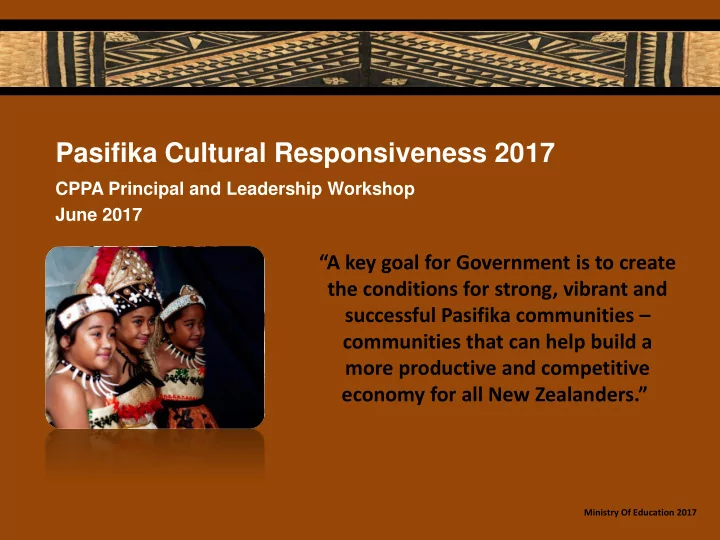

Pasifika Cultural Responsiveness 2017 CPPA Principal and Leadership Workshop June 2017 “A key goal for Government is to create the conditions for strong, vibrant and successful Pasifika communities – communities that can help build a more productive and competitive economy for all New Zealanders.” Ministry Of Education 2017
• Develop knowledge and understanding around Pasifika Success – Pasifika Education Plan • Strengthen cultural responsiveness • Develop strategies to support schools working with diverse learners
Put some in our
PEP EP Vision "Five out of five Pasifika learners participating, engaging, and achieving in education, secure in their identities, languages, and cultures and contributing fully to Aotearoa New Zealand’s social, cultural, and economic well being .“ Pasifika Education Plan, Ministry of Education 2013-2017
WHAT IS THE PASIFIKA EDUCATION PLAN? The PEP is an education strategy aimed at raising the participation, engagement, and achievement of Pasifika learners. It is based around the notion that strengthening school learners will help to strengthen communities.
5 th PEP • 2001 - 2005 • 2006 – 2010 • 2008 – 2012 • 2009 – 2012 • 2013 – 2017 5 KEY FOCUS AREAs • Parents, Families, & Communities (PFC) • Early Learning • Schooling • Tertiary Ministry Of Education 2017 • Education Sector-wide
P a s i f i k a E d u c a t i o n P l a n 2 0 1 3 – 2 0 1 7 LEVERS FOR CHANGE Literacy and Numeracy Accountability and Quality and Effective Performance Teaching PASIFIKA IDENTITY Intergenerational Talanoa Ako Reciprocal Relationships Respect Spirituality Transitions Pasifika Evidence Pasifika Learners, Connectedness Service and Location Parents, Families Leadership and Communities Data Inclusion Governance Belonging and Leadership Identities, Love Multiple Languages Family World Views and Cultures pathways for learners across PASIFIKA ENGAGEMENT Personalising learning and their education journeys Pasifika creating successful Competencies High Expectations for Success Ministry Of Education 2017
The PEP • puts Pasifika learners, their parents, families, and communities at the centre of education decisions • requires all educational providers to respond to the identities, languages, and cultures of each Pasifika group • acknowledges the necessity of involving the wider community in raising achievement Ministry Of Education 2017
The PEP • will use student achievement data and information to increase the knowledge and voice of Pasifika learners, parents, families, and communities • aims to achieve optimum learning by promoting closer alignment and compatibility between the learner’s educational environment, and their home and/or cultural environment Ministry Of Education 2017
TOTAL YEAR 0-6 TOTAL TOTAL TOTAL TOTAL REGION PASIFIKA PASIFIKA PASIFIKA PASIFIKA STUDENT POPULATION % STUDENTS STUDENTS 2836 1666 10,881 436,056 2.6% 57,800 CHRISTCHURCH 326 235 1,055 31,041 3.4% 5200 ASHBURTON 148 90 483 43,929 1.1% 7700 TIMARU
Greeting Thank you Pacific Island/Nation Cook Islands Kia Orana Meitaki maata Vinaka vaka levu Fiji Bula vinaka Ko rab’a Kiribati Mauri Fakaaue lahi Niue Fakaalofa lahi atu Tenkyu Papua New Guinea Gude (goo-DAY) Fa’afetai lava Tālofa lava Samoa Tank iu Solomon Islands Halo oloketa Fakafetai lahi lele Tokelau Talofa ni Mālō ‘ aupito Mālō e lēlei Tonga Fakafetai lasi Tuvalu Fakatalofa atu
Culture is... ...the way of life of a discrete group, which includes a language, a body of accumulated knowledge, skills, beliefs and values...central to the understanding of human relationships and...that members of different cultural groups have unique systems of perceiving and organising the world around them...the ways in which we have been socialised largely influence our behaviour and way of thinking as our world view. [Helu-Thaman, 1998]
Cultural Definitions Cultural awareness is about being aware that there are different cultures whose ways of interacting with others may differ from our own ways Cultural responsiveness is placing the needs of the child/family we are working with at the centre of decision making – identifying and working with the child/family’s strengths to promote positive outcomes Cultural safety is about the child/family who is receiving services and/or support feeling valued, listened to and respected by those working with them
Cultural Awareness Continuum Parochial stage: My way is the only way Ethnocentric stage: I know their way, but my way is better Synergistic stage: My way and their way Participatory Third Culture stage: Our way Adapted from Stephanie Quappe & Giovanna Cantatore
In order to teach you, I must know you Each person brings their own culturally generated tradition in interactions with others and for many this function occurs unconsciously. In our NZ setting the dominant cultural discourse is a Eurocentric world view. [Allen, Taleni, Robertson, 2008]
What is important is the relationship educators have with the child, parents and families; how they relate to and interact with them has an impact on engagement and increases the likelihood of an intervention being successful. [Bishop et al., 2002]
Is our Pasifika community engaged ? What is our Pasifika student data telling us ? How do we ensure key messages about learning and achievement is understood by our Pasifika learner , parents , and community ? How does our school l poli lices , system ems and processes support diverse rse lear arne ners rs ? How do we build/strengthen relationships with Pasifika NGO agencies to support our work?
Pasifika Power Up Plus programme NZEI Teacher Workshops – Carrying the Tapa & Koko Time School based Pasifika Talanoa / Fono Samoan Language Resource Teacher NZQA’s NCEA ma le Pasifika Workshops ESOL Bilingual Assessment Tool & TA PLD course
https://www.educationcounts.govt.nz/publications/pa sifika http://www.tka.nz/teketearonui/Event_catalogu e/Carrying_the_Tapa.aspx http://www.ptap.ac.nz/ https://www.educationcounts.govt.nz/topics/bes/develo ping-mathematical-inquiry/14-culturally-responsive- pedagogy Health Service Providers in Canterbury Etu Pasifika – 173 Montreal St, 365 1002 Vaka Tautua – 105 Bamford St, 376 4677 http://www.vakatautua.co.nz/
“The culture of the child can not enter the classroom until it has first entered the consciousness of the teacher.” Basil Bernstein
Recommend
More recommend